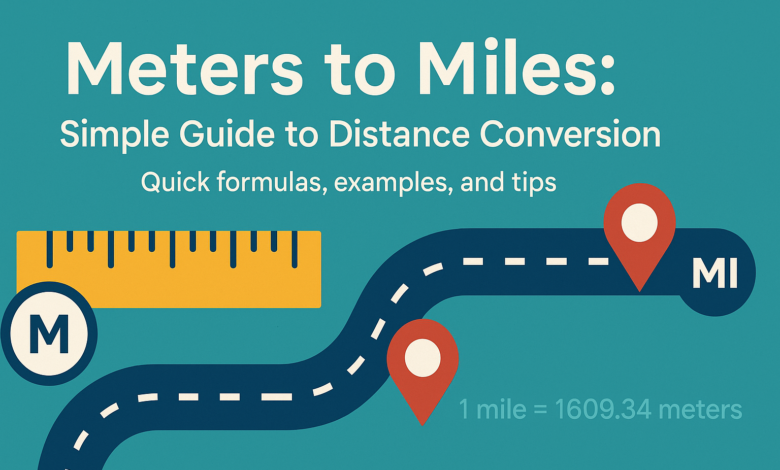Meters to Miles: Simple Guide to Distance Conversion

When it comes to measuring distance, two of the most common units are meters and miles. Meters are used mostly in the metric system, while miles belong to the imperial system. If you’ve ever tried to convert meters to miles, you probably know it’s not as simple as just dividing by 10 or 100. But don’t worry, this guide explains everything in an easy and practical way.
Whether you’re a student, traveler, or someone working with maps, understanding how to convert meters to miles can make life a lot easier. Let’s start with the basics.
What Is a Meter?
The meter (m) is the base unit of length in the metric system. It’s used all over the world, especially in science, engineering, and everyday measurements.
Here are a few quick facts about meters:
- 1 meter = 100 centimeters
- 1 meter = 1.0936 yards
- 1 kilometer = 1000 meters
You’ll often see meters used to measure short to medium distances, such as the length of a room, the height of a person, or the depth of a swimming pool.
Fun fact: The word meter comes from the Greek word metron, which means “measure.”
What Is a Mile?
The mile (mi) is a unit of length used mainly in the United States and the United Kingdom. It belongs to the imperial and US customary systems.
Here are some key points about miles:
- 1 mile = 5280 feet
- 1 mile = 1.609 kilometers
- Miles are used to measure long distances such as road trips, race tracks, or city-to-city routes.
Fun fact: The term “mile” comes from the Latin mille passus, which means “a thousand paces.” The Romans used this to measure how far their soldiers marched.
Meters to Miles Conversion Formula
Now let’s get into the part that matters most: how to convert meters to miles.
The basic conversion factor is:
1 meter = 0.000621371 miles
So, the formula to convert meters to miles is:
Miles = Meters × 0.000621371
That’s it! Just multiply the number of meters by 0.000621371, and you’ll get the distance in miles.
Meters to Miles Conversion Examples
Let’s go through a few quick examples to help you understand how it works.
Example 1: Convert 1000 meters to miles
Formula:
Miles = 1000 × 0.000621371
Answer:
Miles = 0.621371
So, 1000 meters = 0.621 miles.
Example 2: Convert 5000 meters to miles
Miles = 5000 × 0.000621371
Miles = 3.106855
So, 5000 meters = 3.10 miles.
Example 3: Convert 1609 meters to miles
Miles = 1609 × 0.000621371
Miles ≈ 1.0
So, 1609 meters is almost exactly 1 mile.
That’s why 1 mile = 1609 meters (approximately).
Meters to Miles Conversion Table
Here’s a simple table to help you quickly check common conversions.
| Meters (m) | Miles (mi) |
| 100 m | 0.062 mi |
| 500 m | 0.310 mi |
| 1000 m | 0.621 mi |
| 2000 m | 1.242 mi |
| 3000 m | 1.864 mi |
| 5000 m | 3.107 mi |
| 8000 m | 4.971 mi |
| 10000 m | 6.214 mi |
| 20000 m | 12.427 mi |
| 50000 m | 31.068 mi |
You can use this table for a quick reference instead of doing the math every time.
How to Convert Miles to Meters
You might also need to convert in the opposite direction from miles to meters.
To do that, just reverse the formula:
1 mile = 1609.34 meters
So,
Meters = Miles × 1609.34
For example:
Convert 5 miles to meters:
Meters = 5 × 1609.34 = 8046.7 meters
See also: Contact Lens Recycling Programs: Reducing Environmental Impact
Real-Life Uses of Meters to Miles Conversion
Converting meters to miles isn’t just for math homework, it’s useful in many real situations.
Here are a few examples:
- Running and Fitness: Many running apps show distance in meters or kilometers. If you prefer miles, you can easily convert it. For example, a 5K run (5000 meters) is about 3.1 miles.
- Travel and Maps: When looking at international routes or Google Maps data, distances may appear in meters. Knowing how to convert helps you understand how far something really is.
- Science and Engineering: Research data often uses meters, but reports or audiences in the US might expect miles.
- Sports Events: In track and field, distances like 1600 meters or 5000 meters are standard, but many people relate better to miles.
Common Conversion Mistakes to Avoid
When converting meters to miles, people often make a few simple mistakes. Here’s how to avoid them:
- Mixing up meters and kilometers: Remember, 1 kilometer = 1000 meters. If you confuse them, your conversion will be off by a large margin.
- Rounding too early: Keep a few decimal places during calculations, then round at the end for better accuracy.
- Using the wrong conversion factor: Always use 0.000621371 for precise results.
Quick Tips for Easy Conversion
Here are some tricks to make the meters to miles conversion faster in your head:
- Rule of thumb: Divide the number of meters by 1600 to get an approximate value in miles.
- Example: 8000 meters ÷ 1600 = 5 miles (close enough for everyday use).
- You can also remember that 1 mile ≈ 1600 meters, so 10 miles ≈ 16,000 meters.
Conclusion:
Converting meters to miles might seem tricky at first, but once you know the conversion factor 1 meter = 0.000621371 miles it’s simple. Whether you’re tracking a run, planning a trip, or studying measurements, this small piece of math helps you switch between metric and imperial systems with ease.
At Digicalc, we make conversions like this even easier with our simple online tools. The next time you see a distance in meters, just remember:
Miles = Meters × 0.000621371
That one formula or a quick visit to Digicalc is all you need to move confidently between the two systems.




